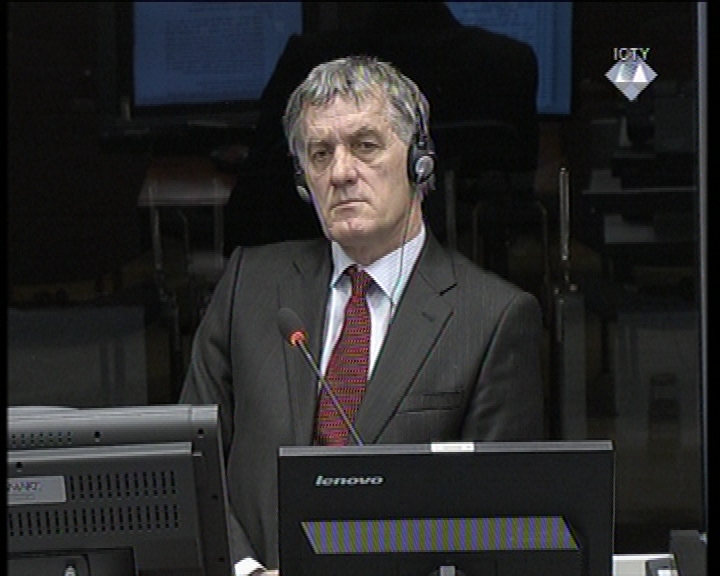Home
POLICE OFFICER DID NOT CONCERN HIMSELF WITH CRIMES
Mile Matijevic, former employee of the Banja Luka Security Services Center, has claimed at Ratko Mladic’s trial that he didn’t know anything about the crimes against non-Serbs in Jajce, Banja Luka, Bosanski Novi, Prijedor and Kotor Varos. The witness never heard of Koricanske Stijene, noting that there were some ‘clues' indicating that crimes were being committed in the Omarska prison camp, but then, in 1995, he began his career in education
 Mile Matijević, defense witness at the trial to Ratko Mladić
Mile Matijević, defense witness at the trial to Ratko Mladić Mile Matijevic continued his evidence at the trial of former VRS Main Staff commander Ratko Mladic today. The witness first worked in the Banja Luka Security Services Center and later joined the crime investigation department in Bijeljina as the deputy chief. He has recently been appointed the dean of the law department at the Business and Financial Studies School in Banja Luka.
In the cross-examination yesterday prosecutor Arthur Traldi stressed that the Banja Luka police had been involved in the operations in Jajce; only about 100 Muslims and Croats remained there after the war. Before the war, as many as 33,000 non-Serbs lived in the municipality. According to Matijevic, there was no ‘ethnic cleansing’ and people from all ethnic communities were leaving Jajce because of the war. As the cross-examination continued today, the prosecutor confronted the witness with the crimes of the so-called Serbian Defense Forces in Banja Luka, Bosanski Novi, Prijedor and Kotor Varos. Members of those units later formed the special police unit. Matijevic initially admitted that he had known that the Serbian Defense Forces were a criminal group, but then bent over backwards to deny it.
In his statement Matijevic said that Simo Drljaca was ‘removed’ fromthe post of the police chief in Prijedor. This would imply that Drljaca was punished for the crimes. The prosecutor however insisted that Drljaca continued to rise through the police ranks. He corroborated his allegation with a video recording of an interview with Ratko Adzic. After Drljaca was appointed to another position, Adzic stated that he ‘wouldn’t say Drljaca has been relieved of his duties’. ‘We did it the ‘Serb way’; given everything he had done, Drljaca could only be promoted’, Adzic made it clear in the interview.
In fact, Drljaca was promoted after the crimes in the Omarska, Keraterm and Trnopolje prison camps and after the Koricanske Stijene massacre, the prosecutor noted. The crimes were committed by the Prijedor police. Matijevic admitted that he had heard about the massacre and knew that there had been an investigation but no one was convicted. ‘There were some clues’ pointing to the crimes in Omarska, Matijevic admitted, but he didn’t know anything in particular. As he explained,‘in 1995 I began my career in education’ and he didn’t press those issues any further.
After that, prosecutor Traldi asked the judges to read out Rule 90 E to the witness. This rule allows witnesses not to answer any potentially incriminating questions, unless the judges compel them to do so. The prosecutor thenquoted Colonel Bogojevic’s statement to the Tribunal’s investigators in which he spoke about the arrests and detention of civilians in Omarska and ‘the bad stuff’ that happened to them there. Matijevic said that he never talked to Bogojevic about that.
Matijevic didn’t know how his name ended up in General Mladic’s diary. In an entry on 27 May 1993 Mladic writes that Colonel Bogojevic informed him that Drljaca had asked the military to help remove ‘the bodies of about 5,000 Muslims’ buried in the Tomasica mine by incinerating or grinding them or in some other way. Matijevic was present at the meeting when Drljaca said that.
The defense will continue its case on Monday, 29 February 2016. Until that time, there will be only one special hearing on 16 February 2016.
Linked Reports
- Case : Mladic
- 2016-02-02 CONTROVERSIAL LIST CONTAINS CONTROVERSIAL NAMES
- 2015-12-17 WHAT CARL BILDT KNEW ABOUT SREBRENICA
- 2015-12-15 SELF-SHELLING FOR ‘THE RIGHT CAUSE’
- 2016-02-05 PUBLIC HEARING ON SERBIA’S NON-COMPLIANCE SLATED FOR NEXT WEEK
- 2016-02-08 BREAK AT MLADIC’S TRIAL, FOCUS ON SERBIA
- 2016-02-28 MLADIC BACK IN COURT
